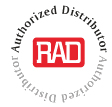Device Management
RAD products can be managed using supervisory or WEB terminals, RADview or 3rd-party SNMP-based NMSs. Follow the links below for detailed description of each management method.
Supervisory Terminal
Configuration is performed by means of an ASCII terminal (or a PC running a terminal emulation program) directly connected to a DCE (or DTE) port on a product. Any standard ASCII terminal (dumb terminal or personal computer emulating an ASCII terminal) equipped with an RS 232 communication interface can be used to configure and control product operation. Different connection methods are explained in Supervisory Terminal Connection Guide.
RAD menu-driven management utility is described on the Menu-Driven Management Utility page. Information about Command Language Interface (CLI), a method of managing RAD products by entering textual commands is given on the CLI Information page.
Web Server
Web-based management utility for remote access to RAD products using a Web browser.
RADview
RADview is RAD’s SNMP-based carrier-class network management system for deployment over Windows and Unix environments. The Network Management Information utility enables you to identify which devices are supported by a selected RADview package, or which packages are used to manage a selected device. The tool also includes a RADview license calculator for determining the number of RV licenses needed to manage a given number of RAD products. See SNMP Technology Backgrounder and SNMP entry in RAD University for theoretical information on SNMP environment.
3rd Party Network Management Systems
RAD products can be integrated into 3rd-party management systems at different levels:
Viewing device inventory and receiving traps
Managing device, including configuration, statistics collection, diagnostics
Integrating RADview NMS into a higher-level OSS (Operating Support System).
The lower-level integration requires RAD MIBs. Standard, private and device-specific MIBs used by RAD products are described in the MIBs section.
Integration of the RADview NMS into higher level systems requires full compatibility with OSSs via the CORBA northbound interface. The following press release details successful integration of RADview-EMS into IBM’s Tivoli Netcool®/OMNIbus™ software.
SNMP Provisioning Guides
To facilitate integration of RAD products into 3rd party management systems, RAD offers SNMP Provisioning Guides or RADview Specifications. SNMP Provisioning Guides describe MIB parameters, OID, indexes, values and PDU sequences needed to discover physical elements and configure RAD products to provide various networking services. They are intended for NMS software developers or system integrators responsible for service provisioning within clients’ proprietary NMS.
A typical SNMP Provisioning Guide provides either full description of product features and parameters, or covers only those relevant for a specific application. Unlike a somewhat similar RADview Specifications documents prepared by and usually for RAD’s R&D personnel, SNMP Provisioning Guides present the information in a more structured and user-friendly manner. See the outline of a typical SNMP Provisioning Guide.
SNMP Provisioning Guides and RADview Specifications are ordered via the Marketing Logistics department (a Catalog Number is provided on request), as per the price list below:
No. of
Pages
Price of
SNMP Guide in $
Price of
RV Specs in $
Up to 30
5,200
4,160
31-40
6,400
5,120
41-50
7,500
6,000
51-60
8,500
6,800
61-70
9,450
7,560
71-80
10,350
8,280
81-90
11,200
8,960
91-100
12,000
9,600
More than 100
15,000
12,000
Eligible discounts: RADCare Basic: 15%, RADCare Plus: 30%, RADCare Extented.: 50%.
